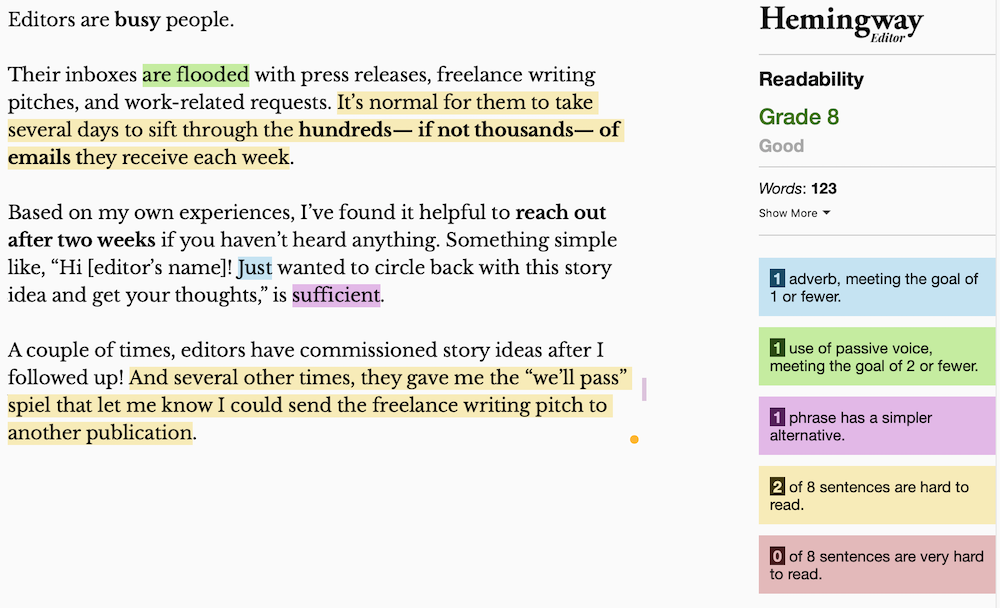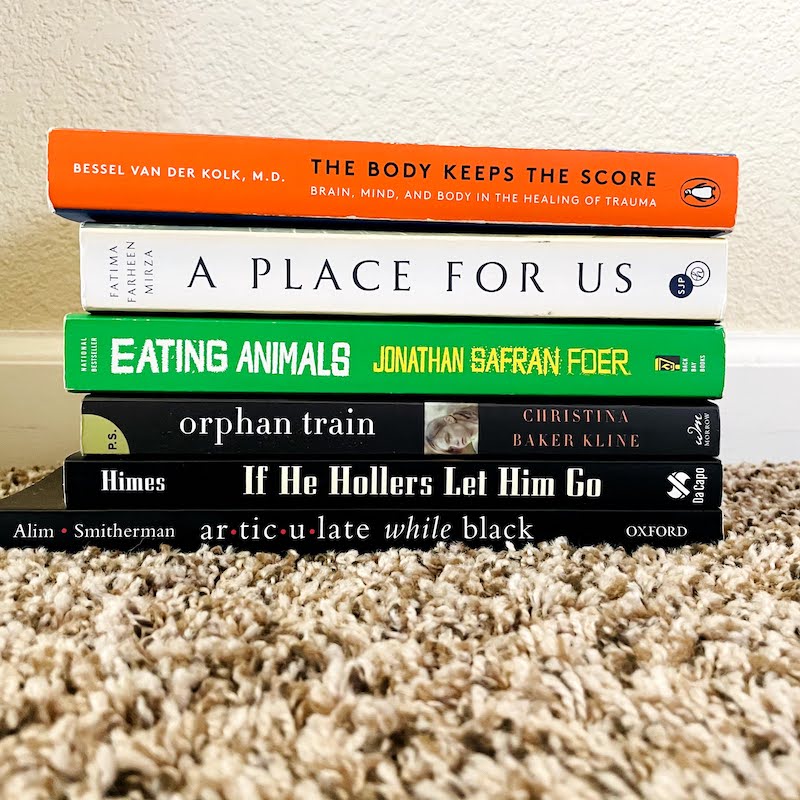So… You want to improve your writing skills?
Well, my friend, you’ve come to the right place!
I’ve considered myself a writer since I was 8 or 9, but I didn’t start taking my craft seriously — from a business and personal perspective — until 2020. In that time, I’ve learned a LOT about how to improve my craft and become a confident wordsmith. Here are the seven strategies that have helped me become a better writer. I think they’ll help you level up your skills, too!
1. Learn the basics
Let’s be real… Learning about grammar — prepositions, active and passive verbs, punctuation — can feel like it happened centuries ago. And with our emoji-laden, shorthand way of texting these days, who even needs grammar, right?!
Not so fast. If you want to improve your writing skills, you have to know the basics (yes, even grammar!). As Pablo Picasso said, “Learn the rules like a pro, so you can break them like an artist.”
The good news is, there are tons of free resources on YouTube to help give you a little refresher (or, if you’re a non-native English speaker, an easy-to-follow crash course) on basic writing rules. A couple of my favorite channels are Reedsy and Alexa Donne.
If your budget allows, I’d also highly recommend purchasing a MasterClass membership or checking out courses on Udemy. I haven’t used the latter, but I’ve taken several writing courses on MasterClass — taught by several of the most respected names in the industry like Roxane Gay, Amy Tan, and Malcolm Gladwell—, and can 100% attest that they’re worth the money.
2. Set aside time to write EACH DAY and PROTECT it
We’re all busy. We’ve all got a million places to be, things to do, and items to check off our endless to-do lists. I get it.
But if you’re serious about leveling up your skills and becoming a better writer, you MUST carve out time in your day to, ya know, WRITE! And be relentless about protecting this time. Turn your notifications off, tell your living companions you need quiet time alone, and allow yourself to be one with your laptop (or tablet or notebook or however you choose to write).
This doesn’t need to be a three or four-hour block of time. Even a fifteen-minute chunk can yield significant benefits, especially when practiced consistently.
If you’re able, I’d also suggest switching up your writing environment to boost your creativity. Speaking from experience, I always feel “in the zone” when I’m writing next to an open window with views of leaves and plants. Or inside a coffee shop. (Nothin’ like the smell of ground coffee beans to get those creative wheels spinning… And I don’t even drink coffee!)
Also, let’s talk about the looming issue many of us writers (seasoned and aspiring) face: writing can be lonely, y’all! That’s why I love Meetup groups like Shut Up & Write, which host in-person (usually in larger cities) and online writing events. Writing with other writers, even if you’re doing it from the cozy confines of your own kitchen, adds a level of accountability.

3. Don’t self-edit and research as you write
Real talk: The first draft of anything will be messy! In fact, it should be messy.
I know a lot of us perfectionists will struggle with the urge to fact-check, spell-check, and polish our work as we write. But this totally kills our flow!
Instead, aim to get your unfiltered thoughts onto the page first. (They won’t be pretty in the beginning, but they’ll get there!) Just let everything out — don’t focus on spelling, grammar, accuracy, etc.
Once you have your (messy!) first draft, then you can go back in and edit.
4. Run your rough draft through the Hemingway Editor
The Hemingway Editor is one of those tools I wish I’d had sooner in my writing journey.
You see, it’s a free site you can copy and paste your work into. Its intelligent software then reads through your work and checks for overall readability. That is, how easy or hard to understand are your sentences? Are you overdoing it on the adverbs? Is there more straightforward language you could be using?
What I also love about the Hemingway Editor is that it’s made me a better writer by simplifying my writing. Yeah, that’s right… The best writing is often the one an 8th grader can understand. And the Hemingway Editor points this out by determining the grade level of your writing. Of course, if you’re writing for an academic audience or people with a higher level of education, you should aim for a higher grade level score. But for blogs, newsletters, articles, etc. (anything read by a general audience), aim for an 8th-grade reading level.

5. Read your work out loud
Yeah, I know hearing your own voice can be cringey at times. But bear with me here… Because it helps!
Reading your work aloud can help you pinpoint any awkward wording, run-on sentences, or repetitive phrases. Normally when we’re reading, our brains can overlook these common errors, so verbalizing our work can help us catch areas that don’t sound quite right.
Good news — I know not all of us will want to hear our own voices, so there’s actually software we can turn to. I’ve used the Read Aloud Chrome Extension several times, and it’s been a game-changer.
6. Be open to feedback from others
Receiving feedback on our writing can feel personal at times. After all, we’re opening up our ideas, and maybe even deeper, more vulnerable parts of ourselves to another person. And if they aren’t resonating with — or understanding — what we have to say, it might sting a little.
But it’s important to remember that feedback is important as a writer. Ultimately, if our goal is to share our work with the world, we want to make sure it’s coming across as easy to comprehend and relate to.
Whether it’s a friend, family member, or critique partner, allowing others to read our work can further point out areas we can elaborate upon or omit. This can also help us get an idea of what’s working well. After all, technology lacks a special superpower: the nuances of human emotion.
It’s daunting at first, but over time, you realize how crucial the feedback process is to your growth as a writer. And it helps you develop a thicker skin — equally important, not just as a creative, but in life!
7. READ!
I had to save the best for last.
For while I love writing, reading has always nurtured my soul in a special way. And not only this, but it has been paramount in helping me learn how the most compelling stories are told.
If you don’t have a reading habit, don’t feel like you need to run straight to the library or meet a particular reading goal. Start off small. You might read for 20 minutes before bed, or in the morning as you make your coffee. The goal is to read as much as you can — both within your own genre, and across others.
If you’re a food blogger, read other food blogs. If you want to write a fantasy novel, read other fantasy books. Then challenge yourself to read within a genre you might not have considered before — memoir, short story, poetry.
Over time, you’ll begin to pick up on subtleties in sentence structure, syntax, dialogue, and so on. And speaking from experience, reading work that resonates with you will help you to develop your own voice. (Plus, reading as an adult is waaay more fun than reading for high school or college classes that have assignments involved!)
Stephen King is famous for his quote on this matter: “If you want to be a writer, you must do two things above all others: read a lot and write a lot.”

Final Takeaways
Remember, just like building any other skill or muscle, writing requires consistent effort, a willingness to endure discomfort at times, and a desire to keep learning. The more you lean into your writing practice, the more comfortable you’ll become on the page.
Becoming a better writer doesn’t require a fancy degree or even expensive educational material. With these seven simple steps, you can begin to level up your writing skills a little bit each day. Over time, you’ll be amazed at how much your writing improves!


